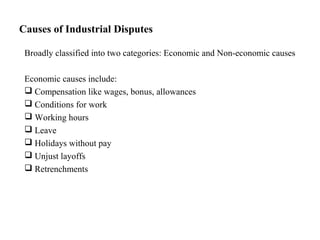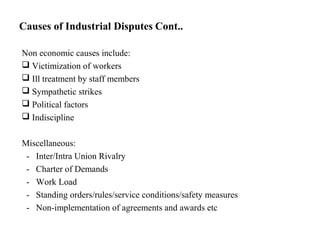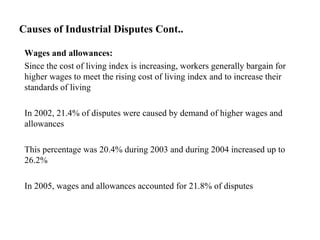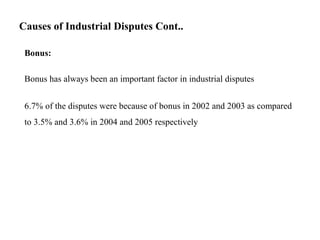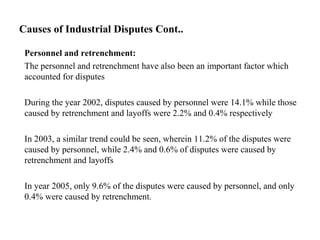Industrial disputes
- 1. Industrial Disputes Defined as any dispute or difference between employers and employers or between employers and workmen or between workmen and workmen which is connected with the employment or non-employment or the terms employment or with the condition of labour of any person
- 2. Causes of Industrial Disputes Broadly classified into two categories: Economic and Non-economic causes Economic causes include: Compensation like wages, bonus, allowances Conditions for work Working hours Leave Holidays without pay Unjust layoffs Retrenchments
- 3. Causes of Industrial Disputes Cont.. Non economic causes include: Victimization of workers Ill treatment by staff members Sympathetic strikes Political factors Indiscipline Miscellaneous: - Inter/Intra Union Rivalry - Charter of Demands - Work Load - Standing orders/rules/service conditions/safety measures - Non-implementation of agreements and awards etc
- 4. Causes of Industrial Disputes Cont.. Wages and allowances: Since the cost of living index is increasing, workers generally bargain for higher wages to meet the rising cost of living index and to increase their standards of living In 2002, 21.4% of disputes were caused by demand of higher wages and allowances This percentage was 20.4% during 2003 and during 2004 increased up to 26.2% In 2005, wages and allowances accounted for 21.8% of disputes
- 5. Causes of Industrial Disputes Cont.. Bonus: Bonus has always been an important factor in industrial disputes 6.7% of the disputes were because of bonus in 2002 and 2003 as compared to 3.5% and 3.6% in 2004 and 2005 respectively
- 6. Causes of Industrial Disputes Cont.. Leave and working hours: Leaves and working hours have not been so important causes of industrial disputes During 2002, 0.5% of the disputes were because of leave and hours of work while this percentage increased to 1% in 2003 During 2004, only 0.4% of the disputes were because of leaves and working hours.
- 7. Causes of Industrial Disputes Cont.. Personnel and retrenchment: The personnel and retrenchment have also been an important factor which accounted for disputes During the year 2002, disputes caused by personnel were 14.1% while those caused by retrenchment and layoffs were 2.2% and 0.4% respectively In 2003, a similar trend could be seen, wherein 11.2% of the disputes were caused by personnel, while 2.4% and 0.6% of disputes were caused by retrenchment and layoffs In year 2005, only 9.6% of the disputes were caused by personnel, and only 0.4% were caused by retrenchment.
- 8. Causes of Industrial Disputes Cont.. Indiscipline and violence: In 2002, 29.9% of disputes were caused because of indiscipline, which rose up to 36.9% in 2003 Similarly in 2004 and 2005, 40.4% and 41.6% of disputes were caused due to indiscipline respectively During the year 2003, indiscipline accounted for the highest percentage (36.9%) of the total time-loss of all disputes, followed by cause-groups wage and allowance and personnel with 20.4% and11.2% respectively A similar trend was observed in 2004 where indiscipline accounted for 40.4% of disputes.

